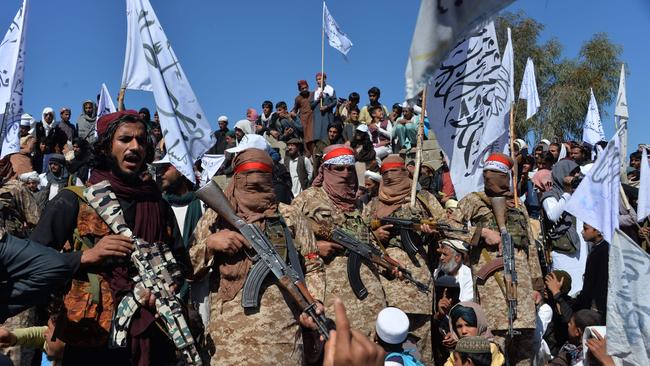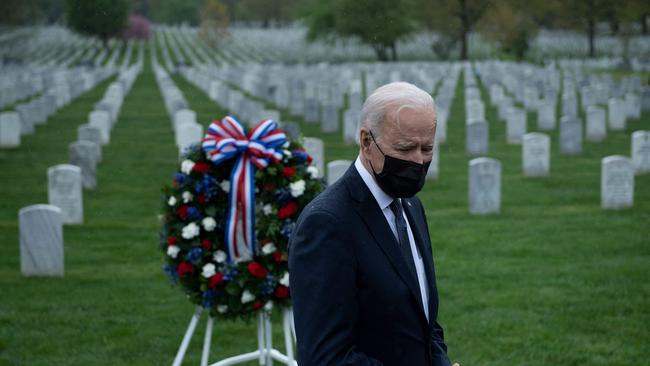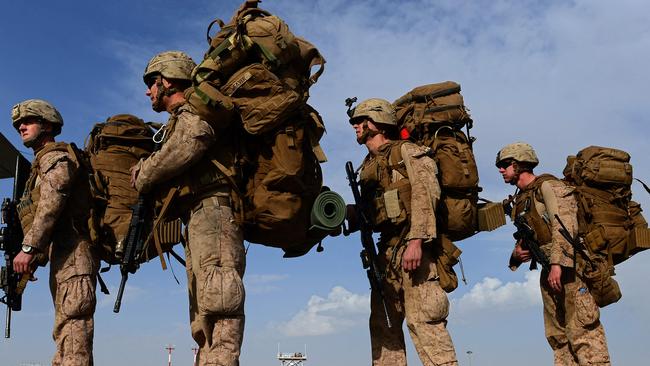America’s withdrawal from Afghanistan a win for Taliban, China
America’s move to pull out of the ‘forever war’ in Afghanistan will only bolster both the Taliban and China.

The US announcement prompted statements from NATO, Australia and other allies, confirming that the international coalition will follow Washington’s lead and withdraw by September 11. Most included comforting words about continuing diplomatic and aid efforts, and reassurances that the international community will remain engaged in the “Afghan peace process”.
In fact there is no Afghan peace process. The Taliban are boycotting talks with Kabul and have refused any form of power-sharing deal. They reject the Afghan constitution, continue quietly co-operating with al-Qa’ida, and regard all foreign presence, and the current Afghan republic — created and sustained by foreigners — as illegitimate. Taliban leaders reacted to Biden’s announcement with contempt, their Voice of Jihad website mocking the US and NATO as “victim to severe confusion and distress”, and pointing to Washington’s dilemma: “If America leaves Afghanistan, the Kabul administration shall collapse. On the other hand, if they [stay], then war will be renewed.” Taliban commanders believe they are winning the war anyway; they think the coalition pullout will only hasten their victory, so they see no need to negotiate.

They might be right, but it feels like overconfidence to me. Even at the height of their power the Taliban never controlled the northwestern third of Afghanistan, or held uncontested influence over the east and south of the country. They are inflicting serious losses on government police and military forces, and these will only rise as coalition troops leave, but it would be a stretch to imagine Taliban troops capturing Kabul anytime soon; Kandahar and other capitals of Pashtun-majority provinces might fall, but Kabul and the old Northern Alliance strongholds in Tajik- and Uzbek-majority regions of the north would be a different matter.
For their part, Afghan government leaders have said they accept the US withdrawal decision but will fight on, emphasising the strategic narcissism of Washington talk about “ending America’s longest war”. The war will not end merely because Westerners leave; instead, it will morph from boots-on-the-ground stabilisation into a proxy campaign much like the wars in Yemen, Syria, Somalia or the Sahel region of Africa: light on ground troops but heavy on drones, air strikes and the occasional long-range special operations raid. Heavy, too, on civilian casualties.
American officials admitted as much the day after Biden’s announcement, leaking plans to base special forces in neighbouring countries, launch warplanes and missiles from ships offshore, continue drone strikes, maintain intelligence networks and continue arming, funding and training the Afghan military from afar. A non-withdrawal withdrawal, as it were — a rehashing, with slightly different language, of former vice-president Biden’s preferred option from 2009 and a recipe for continued, inconclusive conflict, rather than for ending the war.
In humanitarian terms, this is problematic at best. Lack of qualified observers on the ground will make it harder to direct air and drone strikes accurately, increasing risk to civilians, while the commitment to continue arming and training Afghan forces will prolong the war without increasing the chance of victory or making a peace settlement more likely.

Indeed, any leverage the Afghan government might have held, to encourage Taliban negotiators to talk as a precondition for international withdrawal, evaporated the moment Donald Trump agreed, in February 2020, to a unilateral withdrawal by May 1. Biden’s decision to go ahead and withdraw — but to renege on Trump’s deal by extending his deadline to September 11 — arguably represents the worst of both worlds, simultaneously leaving Kabul in the lurch while infuriating and encouraging the Taliban.
So much for the military and humanitarian implications; two other aspects are worth highlighting: the geopolitical implications of Biden’s decision, and its impact on domestic politics in the US.
American leaders from the President down have emphasised the need to leave Afghanistan in order to better posture the US for competition with China, seen as Washington’s key geopolitical rival. But paradoxically, the pullout may bolster Beijing’s authority while emphasising US decline.
Chinese companies own important assets in Afghanistan, including the Mes Aynak mine, one of the largest copper deposits in the world. Despite a corruption scandal among the Chinese mine management, and recent Afghan arrests of Chinese nationals on charges of spying for Beijing, Aynak remains a huge potential source of revenue for Afghanistan, part of a growing web of economic linkages with China. The coalition withdrawal creates incentives for enhanced security co-operation between Kabul and Beijing, as both sides seek to protect those linkages.

Likewise, China’s recent comprehensive economic and security agreement with Iran — and the construction of roads, ports and pipelines across the broader region under the Belt and Road Initiative — create incentives to deepen Afghanistan’s already substantial economic relationship with Iran as part of a regional trading, energy and transport system that is increasingly China-centric.
China’s other major regional ally is Pakistan, whose support has historically been one reason for Taliban resilience. Pakistani support is, in part, driven by fears of a power vacuum or, worse, encirclement through increased Indian presence in Afghanistan. Since China and India are major rivals, increased Chinese influence in Afghanistan could allay anxiety in Islamabad, negating the need to tolerate the Taliban. This could be a good outcome for regional peace, but in geopolitical terms it would amount to Washington ceding the field to its main adversary while weakening India (seen as an emerging US partner through the Quad mechanism that includes India, Japan, Australia and the US). All this suggests that, far from helping America compete with China, the Afghan withdrawal may simply cement China’s role in the region.
None of this is at the forefront of political debate in the US. Amid an ongoing pandemic, months of urban rioting, a bitterly contested election that half of Republican voters (and even a third of Democrats) believed was stolen from Trump, with razor-wire fencing still in place around a Capitol building that remains under military occupation months after Trump supporters stormed it in January, ending the “forever war” is well down the priority list for most Americans. No US military member has been killed in Afghanistan for more than a year, the billions spent there pale into insignificance aside trillions in pandemic stimulus, and the 3500 US troops in country could — if not for Trump’s withdrawal deal — have remained there indefinitely with little impact.

Indeed, a smart but cynical approach for Biden would have been to go ahead and withdraw but blame Trump, forcing the former president to shoulder the responsibility for any negative consequences. Biden began his speech in that vein — saying that, like it or not, the US needed to honour Trump’s agreement — but then spent the rest of the speech justifying the decision to leave.
By the end, he had so aligned himself with the decision that, whatever happens next, he now owns the outcome. It’s also probably only a matter of time before someone asks the obvious question: If it was so essential to pull American troops out of Afghanistan in order to end the forever war and focus on China, what about the thousands still deployed in Iraq and Syria? Shouldn’t they come home too? Trump’s answer would have been a resounding “Yes”. What is Biden’s? With the midterm elections still almost two years away, there is plenty of time for any negative outcome in Afghanistan, or any inconsistency on Iraq, to harm Biden politically.
From an Australian perspective, the coalition withdrawal also ends our troop commitment in Afghanistan. This has been minimal since Australian combat forces withdrew at the end of the ISAF mission in 2014, with about 80 Australians currently deployed as part of an overall coalition presence of 10,000 (including 3500 American and 6500 allied troops). Our contribution has been, and continues to be, valued by our coalition partners and the Afghan civilian officials, police and military units with which Australians worked.

For Australians, the legacy of our commitment to Afghanistan has been tarnished by allegations of war crimes against approximately 40 of the 39,000 Australians who served there, leaving a bitter taste for the overwhelming majority who did a tough duty with professionalism, competence and compassion. Still, even without the allegations, this announcement leaves many veterans and their families asking whether it was all worth it. The answer depends on what happens next in Afghanistan and, more importantly, how Australia responds to it.
What, for example, will be our policy on accepting refugees from Afghanistan, including those who worked with us and may now be at risk? What will our economic aid and diplomatic posture be? Will we use our considerable influence with allies, and our positive reputation with Afghan partners, to promote a peaceful outcome? All this remains to be seen, in a war that will go on regardless of the coalition’s departure, however much Biden and other politicians might like to pretend otherwise.


President Joe Biden’s withdrawal announcement dominated discussion in Kabul this week, but three trending stories on Tolo, a popular Afghan news channel, emphasised what the US-led coalition leaves behind. A woman in Herat province was publicly flogged by the Taliban for an alleged affair, the UN reported a 38 per cent spike in civilians killed or wounded over the last six months, and Taliban fighters attacked the main military base in Zabul province, killing 10 soldiers and emphasising their expanding rural influence, even as they continue launching terror attacks into urban centres.